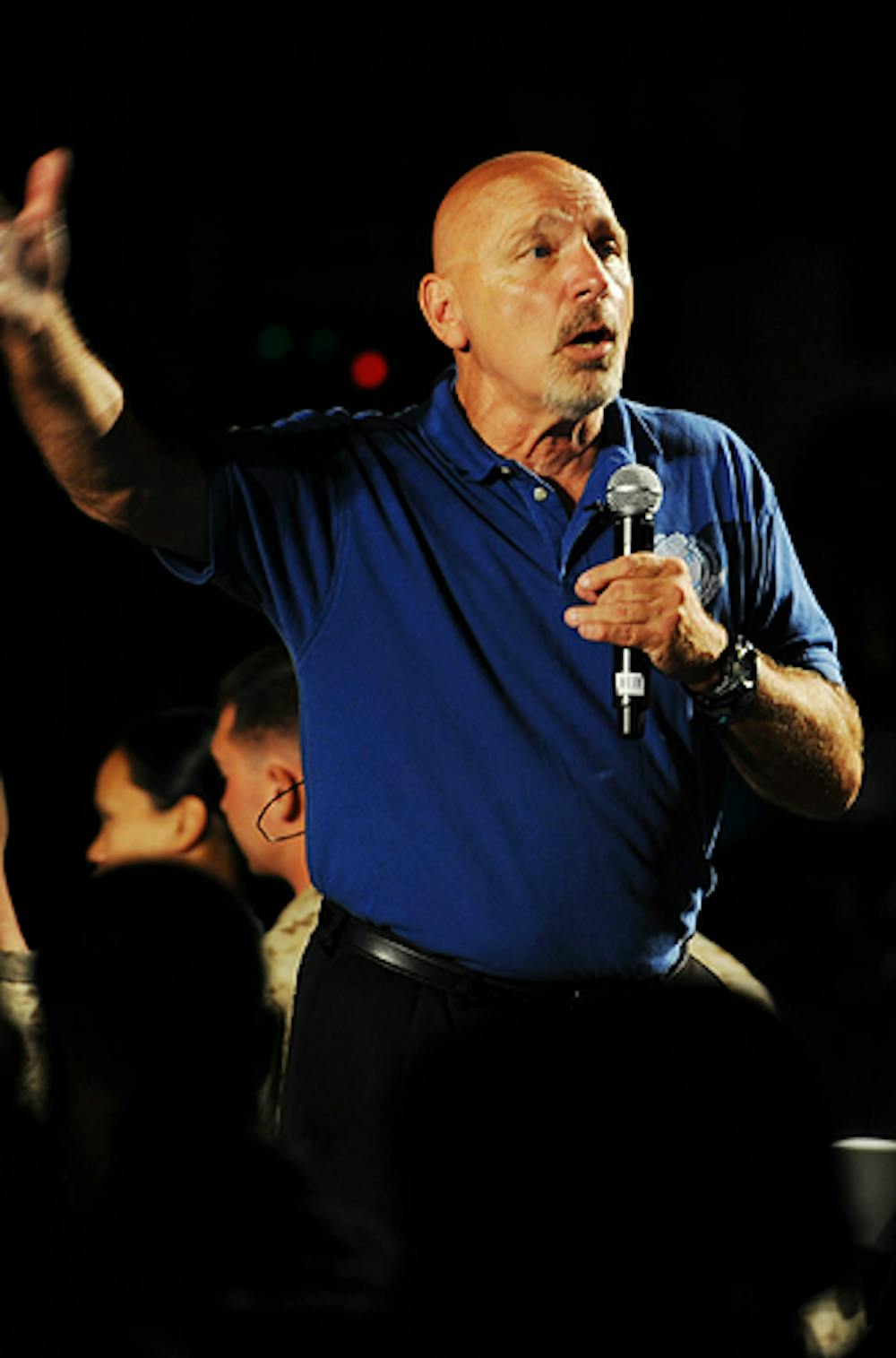Thompson retires after years of advocacy
When Oprah Winfrey asked Steve Thompson to be a guest on her show, he politely declined.
"She wanted me to come on the show and show self-defense, but didn't want to talk about the realities of sexual assault," said Thompson, director of Central Michigan University Sexual Aggression Services.
Thompson cites many misperceptions surrounding sexual aggression as one reason he's been researching the topic since the 70s. Upon his retirement in June, Thompson is leaving the university after working since 1973. He served as the adviser for Sexual Aggression Peer Advocates, the university's 24-hour crisis hotline for victims of sexual aggression, an internationally-recognized program which he founded in 1996.
Research
Though he was hired to teach martial arts, scuba diving and be the assistant track coach, Thompson wanted to focus on educating students about sexual assault.
But he didn't want to do what everyone else was doing, he wanted to expand the conversation. Thompson wanted to interview people who were being left out of research on the topic--the rapists.
"It's something I learned in sports," he said. "You prepare for your next opponent by looking at game film. You have to know who they are."
His goal was to learn more about who rapists were and how they operated. During his research, he studied in Albuquerque with the FBI.
"They had been talking to rapists, but not from the angle I wanted," Thompson said. "I wanted to know how they did it. Did they attack from the front or behind? Things like that weren't really identified back then."
After being trained by the FBI on the behavioral science of profiling, Thompson knew how predators operated--but he didn't know who they were. Since the FBI had that information, each was able to learn more. Thompson said he started to notice patterns.
"Every day it was either sexual assault or domestic violence," he said. "You could predict when the guy was going to attack the woman. You could see the progression."
When he returned to CMU, he started studying familiar sexual assault, meaning sexual assault committed by a friend or acquaintance. In 1994, Thompson wrote a behavioral analysis of the topic--the only research of its kind at the time. He presented his research at conferences around the country and said he was always met with affirmation.
"People would come up to me and say, 'that's what happened to me,'" he said. "Rape crisis centers would say that's what they were hearing every day."
After looking at the perpetrators, Thompson knew he needed to get to know survivors. In 2000, he studied the commonalities amongst them and created a profile. He said it made people realize the most dangerous time is for freshmen the first two months of their college experience.
"They are usually younger and in a social setting," he said. "Alcohol and drugs are used as tools. It's extremely consistent."
On campus
During his research, Thompson noticed a disjointed approach to sexual assault and advocating for survivors at CMU.
"There were a lot of different groups on campus doing programs about sexual assault and communicating with victims, but there was no consistency or coordination."
This led Thompson to write a "fairly scathing" letter to Bruce Roscoe, the Dean of Students at the time. Roscoe said the university was aware of the occurrence of sexual assault at CMU and nationwide, but there was not a cohesive strategy addressing it. When Thompson approached him, Roscoe could see the commitment level and experience he had.
"He had been doing a great deal of work in this area and saw the need for CMU to do more," Roscoe said. "It was obvious to me that Steve would be a tremendous resource to CMU. I was pleased to offer whatever support I could to him. He had ideas which could change CMU's support of students tremendously."
Roscoe saw the problems Thompson pointed out and created a new position at the university. Within that position, Thompson said there were two must-haves: a program to educate new students and a peer advocacy system for survivors. Roscoe approved the start of SAPA, and the first training was established.
"The university now had an identified person who was recognized as an authority, resource, leader and advocate focused on sexual aggression education and prevention," Roscoe said. "This enabled us to talk about sexual aggression more widely."
Thompson wanted to make sure every person who came into contact with a victim knew what they were doing. He called this the "matrix," using the term to refer to each point of contact a survivor has. Thompson said having high numbers of reported assaults is better than low numbers--it means more people are reporting.
The university jumped on board with that way of thinking, Thompson said.
"They were aware that if SAPA does what it's supposed to do, the numbers are going to go up," he said. "There would be more people coming into the system for help."
Today and beyond
With changes made to Title IX, CMU has had to adjust the way it handles reports of sexual aggression. Thompson said the university is more progressive than others.
"They are doing everything they can for survivors," he said. "We're pushing the envelope as as far as what the (federal government) wants and what we think is the right thing."
For SAPA, this year will be the biggest group of advocates going through a 50-hour training to learn how to communicate with victims. There are more men in the program than ever.
"I can't say I want to go, but it's the right time to go," Thompson said. "I could work with SAPA until I'm on the other side of the dirt. They're wonderful, but it will go places that I probably wouldn't have thought of."







